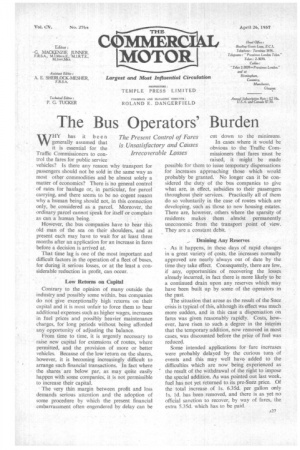The Bus Operators' Burden
Page 29

If you've noticed an error in this article please click here to report it so we can fix it.
wHY has it been generally assumed that it is essential for the Traffic Corriniissioners to control the fares for public service vehicles? is there any reason why transport for passengers should not be sold in the same way as most other commodities and be almost solely a matter of economics? There is no general control of rates for haulage or, in particular, for parcel carrying, and there seems to be no cogent reason why a human being should not, in this connection only, be considered as a parcel. Moreover, the ordinary parcel cannot speak for itself or complain as can a human being.
However, the bus companies have to bear this old man of the sea on their shoulders, and at present each may, have to wait for at least three months after an application for an increase in fares before a decision is arrived at.
That time lag is one of the most important and difficult factors in the operation of a fleet of buses, for during it serious losses, or at the least a considerable reduction in profit, can occur.
Low Returns on Capital Contrary to the opinion of many outside the industry and possibly some within, bus companies do not give exceptionally high returns on their capital and it is most unfair to force them to bear additional expenses such as higher wages, increases in fuel prices and possibly heavier maintenance charges, for long periods without being afforded any opportunity of adjusting the balance.
From time to time, it is urgently necessary to raise new capital for extensions of routes, where permitted, and the provision of more or better vehicles. Because of the low 'return on the shares, however, it is becoming increasingly difficult to such financial transactions. In fact where the shares are below par, as may quite easily happen with some companies, it is not permissible to increase their capital.
• The very thin margin between profit and loss demands serious attention and• the adoption of some procedure by which the present financial embarrassment often engendered by delay can be cut down to the minimum.
In cases where it would be obvious to the Traffic Commissioners that fares must be raised, it might be made possible for them to issue temporary dispensations for increases approaching those which would probably be granted. No longer can it be considered the duty of the bus companies to give what are, in effect, subsidies to their passengers throughout their services. Practically all of them do so voluntarily in the case of routes which are developing, such as those to new housing estates. There are, however, others where the sparsity of residents makes them almdst permanently uneconomic from the transport point of view. They are a constant debit.
Draining Any Reserves . As it happens, in these days of rapid changes in a great variety of costs, the increases normally approved are nearly always out of date by the time they take effect. Consequently, there are few, if any, opportunities of recovering the losses already incurred, in fact there is more likely to be a continued drain upon any reserves which may have been built up by some of the operators in the past.
The situation that arose as the result of the Suez crisis is typical of this, although its effect was much more sudden, and in this case a dispensation on fares was given reasonably rapidly. Costs, however, have risen to such a degree in the interim that the temporary, addition, now removed in most cases, was discounted before the price of fuel was reduced.
Some intended applications for fare increases were probably delayed by the curious turn of events and this may well have added to the difficulties which are now being experienced as the result of the withdrawal of the right to impose • the special addition. As was pointed out last week, fuel has not yet returned to its pre-Suez price. Of the total increase of Is. 6.35d. per gallon only is. Id. has been removed, and there is as yet no official sanction to recover, by way of fares, the extra 5.35d. which has to be paid.




























































































